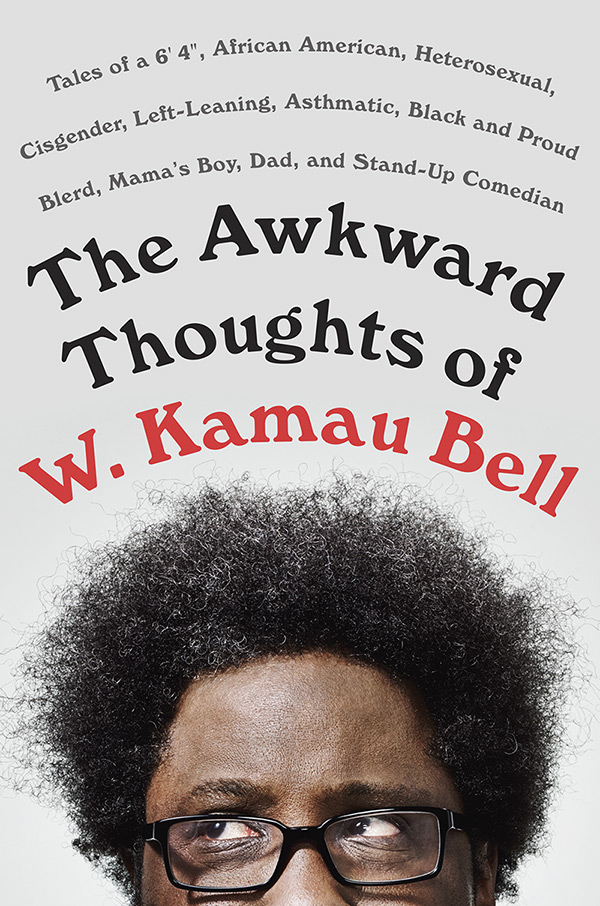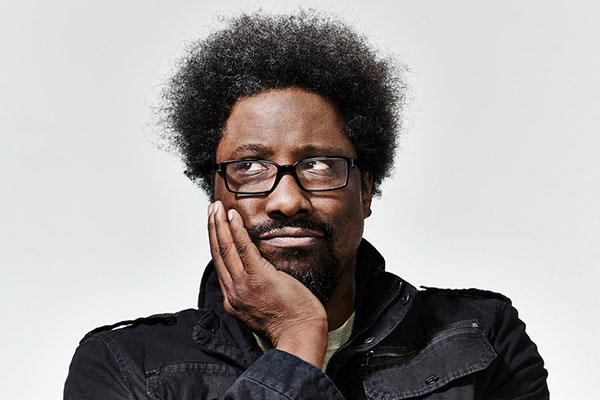Tales of a 6′4″, African American, Heterosexual, Cisgender, Left-Leaning, Asthamtic, Black and Proud Blerd, Mama’s Boy, Dad, and Stand-Up Comedian
By W. Kamau Bell
2017
Conversations with smart people about stuff that affects our world, and how we affect it
Critically-acclaimed comedian, sociopolitical explorer and host of the Emmy Award-nominated CNN docuseries “United Shades of America” W. Kamau Bell has been lauded by the New York Times for his talent and political comedy. He shares his perspective on how humor is useful in taking on serious issues, and why taking them on is important for all of us.
Critically-acclaimed comedian and sociopolitical explorer, W. Kamau Bell gets real about humor and social change, and why both are important.
Transcript
Megan Hayes: Critically acclaimed comedian and sociopolitical explorer W. Kamau Bell, who has been lauded by the New York Times for his talent and political comedy is the host of several podcasts including, ‘Denzel Washington is the Greatest Actor Of All Time, Period’ and ‘Politically Reactive.’ He also hosts the public radio show ‘Kamau Right Now’ which airs on KALW in San Francisco and has written for Vanity Fair.com, Salon, MSNBC.com, Buzzfeed and The Hollywood Reporter. His television projects include the FX comedy series ‘Totally Biased with W. Kamau Bell’ and his most buzzed about project of late, the Emmy Award nominated CNN docuseries ‘United Shades of America’ in which he selects and visits locations in the United States to examine their racially defined subcultures. These explorations have led to some pretty intense situations including his witnessing a cross burning at the Ku Klux Klan rally and embedding for a week in a San Quentin prison, and getting to know the police in Camden, New Jersey who are working to improve their policing by getting to know the communities they serve. Through it all, and some less intense situations like handing out in a tiny house with a small business owner in near by Asheville, Bell looks for the humor, which isn’t always easy to find. W. Kamau Bell welcome to Boone, North Carolina and welcome to Sound Affect.
W. Kamau Bell: Thanks for having me.
MH: We’re so glad you’re here. So I would like to begin by asking you about humor and why humor in the context of these incredibly complex and emotionally charged topics that you address?
WKB: How not humor in the middle of these complex topics? Yeah, I don’t know how you would get through all of this without humor and sugar. You need something to make things feel a little bit better and some of the best humor that has ever been produced, definitely in the country and maybe even the world comes out of painful situations. Usually the most oppressed group in this country is the funniest group of this country. I don’t know how you would get through life without laughing through difficult situations. A lot of times people think laughter is disrespectful but laughter is often just a tension reliever and a way to go “yeah we’re all doing this; this is all happening.”
MH: And maybe sometimes a way to relate with people that you don’t know or maybe not agree with.
WKB: The thing about humor is that if somebody’s laughing at something you say that means they’re paying attention. People generally don’t laugh if they’re not paying attention, and if they do you can tell that they’re faking it. I’m a comedian but before that I was just a person and I find that when you’re talking to somebody, when they laugh the way you (Megan) almost did, I know that they’re paying attention to things I’m saying. Whereas, I can tell a very sad story and if it’s not funny you can sit there and go “mhmm mhmm” and could be thinking about lots of other things, but if I make the sad story funny and you laugh then I know you’re paying attention.
MH: One of the things about comedy and college campuses is that they don’t seem to get along as well as they used to. There were days when comedians would do their shows at college campuses and it seems like in the past couple of years there’s been this hesitation from major comedians to perform at college campuses.
WKB: I think you’re referencing the Seinfeld/ Chris Rock thing. I know Chris, he was a producer of ‘Totally Biased’ he hasn’t been performing at colleges for a long time and what I understood from their conversation was that somebody told Seinfeld something that Seinfeld didn’t tell Chris so it becomes a game of telephone a little bit, millionaire telephone. College campuses are hard places to perform and they’ve always been that way. You can't just do everything you do because the university usually brings you there for a reason and even if they say, “do whatever you want to do” you’re inevitably going to find people whose lines you’re going to cross. Now the difference in the 21st century is that people whose lines you cross can immediately tell the world that you crossed that line whereas 20 years ago somebody would just be offended and have to tell their friends but now they can literally tell the world and if the world thinks it's interesting it becomes a major news story. So college campuses have always been more charged places to perform. Most huge comedians don’t perform on college campuses and never have. College campuses for a lot of comedians is something you do until you either age out or you become so successful you don’t have to do it anymore. So I’m probably on the aging out spectrum—it's like performing at a wedding reception, everybody there is there for a reason, they’re all thinking about the reason they're there, and you have to address that reason, and if you offend the bride then you’re not going to be able to get through your gig, so everybody on a college campus is kind of the bride.
MH: Interesting. So I heard you tell this story on ‘This American Life’ a couple years ago about you getting shooed away from a café when you were talking to your wife and her friends—
WKB: It's just funny because it happened on my birthday and today is my birthday; I never expected on the two year anniversary I would be telling that story.
MH: Oh well happy birthday! Let me remind you of something really annoying that happened on your birthday a few years ago. That made me thinks a lot about that conversation. I was wondering if you wouldn’t mind just briefly telling what happened, sorry to make you relive that.
WKB: Well because it happened on my birthday I think about it every time I have a birthday so I sort of think that this will be part of what my birthday means for the rest of my life, especially because nothing good has come out of it really, nothing that means anything other than having this story. It was two years ago, I was at home, and I wasn’t working like I am today. My wife and I had breakfast in a nice café that she likes to go to and then I left that café and then went back to meet my wife later and when I got there my wife was sitting outside with our 13 week old baby and a bunch of moms and their babies because there was a moms group, and as I walked up and started talking to my wife somebody in the café knocked on the window and told me to keep it moving basically. It became clear that they thought I was harassing these women at best and harassing and homeless at worse, who knows. From what I understood later, somebody who was eating at the café told the management that I was harassing the women and I wasn’t, they were all laughing, well at least not screaming. So the restaurant instead of eying the situation and taking it in to see what was happening just immediately decided that “oh there’s a black guy talking to white women, we have to stop that situation” and this is Berkeley, California so it's not something that is supposed to happen there but of course happens there all the time.
MH: Well, I don’t know, maybe something good did come out of it—
WKB: Well the good is that I’ve told the story, a lot of people have heard the story, a lot of people of color that have heard that story have sort of opened up about things that happened to them. When you’re a member of an oppressed group, a lot of times things that happen to you, you don’t want to talk about the painful things all day because then you sound crazy. So for me, this was a way for people who are being treated poorly in public by lots of retail places going “yeah that happens to me but I didn’t want to talk about it because I didn’t want to look like I was making a big deal out of something”. So a lot of good has come out of it, it's just the fact is the café promised it would do a lot of things to change the ways that their restaurant interacted with people and change the way that restaurants on that street interact with people and eventually take it to the city level and then the world and they didn’t. It became a pretty big Bay area local news story “Comedian J. Jamako Fudge Gets Kicked Out of a Cafe” but as soon as the press died down, they stopped doing anything and stopped answering my emails. Considering the era of America that we’re in right now, if we can't get through to a café and figure out how to make that situation better, how are we going to deal with what’s going on right now.
MH: Well that’s what I was wondering because I went on their website and was looking and they have all of these social justice things that they do and they said they fired the server—
WKB: And that’s not the problem. Its institutionalized racism and institutionalized oppression doesn’t end if you fire one person. I don’t believe that that server went to work that day saying “I’m just mad at black people” I believe that it's more about how you train your servers, and that server was told that if people are harassing our customers, and this is what those people look like, and this is how you know it's that person then say something to them. And the funny thing for me is that I was wearing a knit cap and a hoodie which in the Bay area could mean I’m a billionaire because that’s how Zuckerberg dresses. So to me that was like taking the easy way out. People have the expression “think globally, act locally” well I think that café has “act globally, ignore locally.”
MH: I just kept thinking about what’s the responsibility of the business in this because it could have turned out so many different ways and obviously it's like, this bad thing happened and maybe they didn’t train their staff that way and maybe this person was playing her role in this social construct. So to me it was kind of like a cautionary tale. Sure I have done something like that without even realizing that I’ve done it in the past and don’t want to do that again but that’s the kind of thing—like when you’re talking about having awkward conversations, if the café could have done something like that and maybe facilitated conversation so that people could just own up to it.
WKB: It's funny, we had a community meeting about it and the owner promised a lot of stuff and nothing happened but the funny thing for me was that we just passed where my daughter goes to preschool and in the Bay area you see signs up that say “All are Welcomed” and you see a picture of a woman to looks to be a Muslim woman and I thought that was funny and wonder “am I welcome yet?” So for me the Bay area has a reputation for being progressive and politically to the left but in a lot of places there’s a lot of talk about things but there’s no action. Which is why people have a lot of feelings about the Women’s March. A lot of people in the Women’s March are people who were probably all talk and people who ignored the way the political winds were blowing in this country and now they’re actually getting out of their houses, which becomes another complicated situation; who is the march for, who is represented, how is it inclusive, is it doing the right things, what happens next and so on, but hopefully it’s doing the right thing.
MH: Yeah that was on my list to ask you about but I cut it out because I told you I was going to ask you four questions. I am going to cut to the last question so I don’t take up too much of your time. This is a really white campus; you’ve been on our campus for all of 5 minutes--
WKB: Yeah I Googled it. I always Google these things.
MH: Yeah we’re excited about the progress we’ve made to have 17% of our first year class to come from underrepresented populations, so that’s where we’re coming from here. So here we are, we’re sitting at the edge of this massive paradigm shift for demographics nationwide and this millennial group are going to be the ones at the very edge of this, so thinking about that and what you’re going to say tonight, what advice do you have for our students who are sitting at this precipice and figuring out how to navigate their way forward.
WKB: I think my biggest advice is don’t be afraid, or negligent, or reluctant to speak up to help create the world you want to see, because some people certainly aren’t. And so if you want the world to be different, figure out a way to make that happen, whether it be small ways like checking your friends and their privilege or big ways like starting a rally or boycott or protest, or calling your congressperson, all these things help. I think the last election proved that many people thought they were in action but they were actually on the sidelines and so for me it’s like, you have to get in the game otherwise you get what you deserve.
MH: W. Kamau Bell thank you so much for taking the time for us today. I know you’ve got a big night ahead of you so thank you for stopping by and spending some time to chat with us before you go on stage.
WKB: Thank you for having me.
Critically-acclaimed comedian and sociopolitical explorer, W. Kamau Bell gets real about humor and social change, and why both are important.
What do you think?
Share your feedback on this story.
Tales of a 6′4″, African American, Heterosexual, Cisgender, Left-Leaning, Asthamtic, Black and Proud Blerd, Mama’s Boy, Dad, and Stand-Up Comedian
By W. Kamau Bell
2017
Conversations with smart people about stuff that affects our world, and how we affect it
About Appalachian State University
As a premier public institution, Appalachian State University prepares students to lead purposeful lives. App State is one of 17 campuses in the University of North Carolina System, with a national reputation for innovative teaching and opening access to a high-quality, cost-effective education. The university enrolls more than 21,000 students, has a low student-to-faculty ratio and offers more than 150 undergraduate and 80 graduate majors at its Boone and Hickory campuses and through App State Online. Learn more at https://www.appstate.edu.





![How NCInnovation Is Rethinking Economic Development in North Carolina [faculty featured]](/_images/_posts/2026/02/rethinking-economic-development-600x400.jpg)









